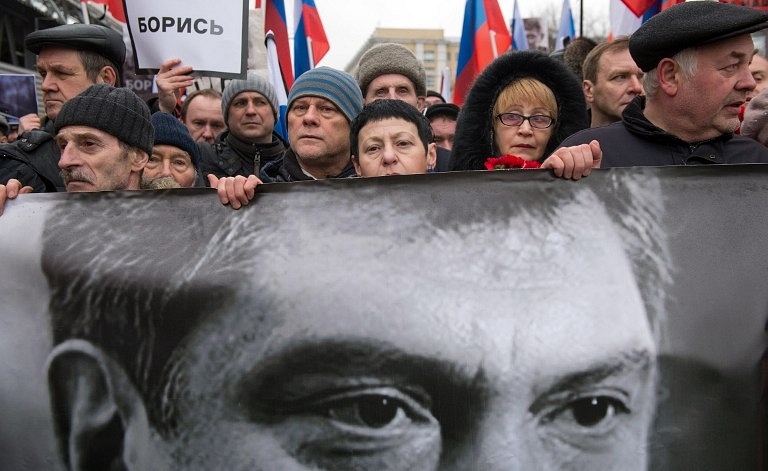World
The Killing Of Boris Nemtsov – At Face Value

Anticipating the likely reactions to the tragedy
Boris Nemtsov, the former deputy prime minister and very vocal opponent of Russian President Vladimir Putin’s government, has been murdered in Moscow, near the Kremlin. Broadly, four perspectives will be drawn on the issue in the global media in the days and weeks ahead.
The first, and the one most likely to dominate the airwaves in the English language broadcasting world, is the unsubtle but unstated accusation that Putin was behind it. This line plays well with the overall worldview propagated, with varying degrees of stridency, by the BBC, CNN, Sky, Fox, etc. To wit: Putin evil, US good, Britain agrees, and Australia, New Zealand and Canada follow. For a suggestion of balance, there will be a couple of analysts saying well it’s too early to be definite, there may be mafia interests behind it, etc. One can be fairly certain though that the overwhelming projection will be that it is all down to Putin and his thuggish ways.
Second will be the Kremlin view, which will in turn be articulated with requisite faithfulness by the Russian media. Relevant channels, newspapers and other sources are equally transparent in their leanings, the only difference being that the global public is probably surprised that a channel like Russia Today can seem so neutral, so vastly different from Soviet days; in many ways indistinguishable from, say, the BBC. Putin has called the shooting of Nemtsov a “brutal murder” (just like US President Obama did) and there have been reports that he intends to take personal control over the investigation. That concerned but firm approach will be the expected line from the Russian newsmedia.
Third will be the fence-sitter’s perspective, where you will find a lot of the continental European media. Following the Ukrainian fiasco, it is unlikely that many European countries will follow the “Anglo” line with any enthusiasm. There will be a much more nuanced approach, laced with greater scepticism, some hedging, and a general sense of resignation. This seems to be the mood in much of the EU these days. Coverage of the murder will not last very long here, certainly less than a week, and may be the subject of a few talk shows.
The last perspective will be that of the rest of the world, which make up about 40-50% of the global population, the “don’t give a damn about it” category – who will report the incident cursorily, probably copy-pasting the reportage from the cheapest news service provider on the spot. The murder may be reported for a day, at most two. Many countries will not even bother. There’s the budget presentation in India, and the New Year celebrations in China (appropriately perhaps, the Year of the Sheep). Life goes on, and there are more important things to worry about nearer home than expressing false concern about Russian adherence to democratic principles.
Reactions in the global social media networks will also, broadly, follow the above four lines – punctuated by emoticons, cuss words and earnest statements that it was all done by the Bilderberg Group. It will trend moderately for a while before being replaced by the next dress of uncertain colour, or some such.
The first three perceptions will be expressed with a steadily declining frequency as the weeks go by, but with each new expression reinforcing the perception that it articulates – perhaps with an additional bit of data or a new analytical perspective. Ultimately it will die down, only to resurface later whenever one party or another wants to use it to justify or bolster their point of view vis a vis Russia. You can bet your last dollar that if there is a sudden improvement in relations between Moscow and “the West”, Nemtsov will be forgotten before you can ask: “Who was that Ukrainian woman with him when he was shot?”
As for the murder itself, the prospect that an investigation will lead to charges that fully align with any of the above perspectives is slim indeed. Nemtsov was a fairly marginal politician in today’s Russia, but his death is a political event of moderate significance. That is how it will play out in the media for a while, until it becomes a historical footnote in a couple of years from now – if that.
Boris Nemtsov is dead. He was a courageous man, with flaws like all men and admirable quantities like many. His death must be mourned. This sort of thing is not good for Russia, and the reality that such violence is occurring with an unnerving regularity is a cause for concern for all well wishers of that country. That includes this writer.
Introducing ElectionsHQ + 50 Ground Reports Project
The 2024 elections might seem easy to guess, but there are some important questions that shouldn't be missed.
Do freebies still sway voters? Do people prioritise infrastructure when voting? How will Punjab vote?
The answers to these questions provide great insights into where we, as a country, are headed in the years to come.
Swarajya is starting a project with an aim to do 50 solid ground stories and a smart commentary service on WhatsApp, a one-of-a-kind. We'd love your support during this election season.
Click below to contribute.
Latest